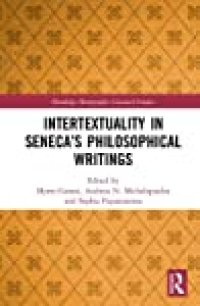
Ebook: Intertextuality in Seneca’s Philosophical Writings
This volume is the first systematic study of Seneca's interaction with earlier literature of a variety of genres and traditions. It examines this interaction and engagement in his prose works, offering interpretative readings that are at once groundbreaking and stimulating to further study.
Focusing on theDialogues, theNaturales quaestiones, and theMoral Epistles, the volume includes multi- perspectival studies of Seneca's interaction with all the great Latin epics (Lucretius, Vergil and Ovid), and discussions of how Seneca's philosophical thought is informed by Hellenistic doxography, forensic rhetoric and declamation, the Homeric tradition, Euripidean tragedy and Greco-Roman mythology. The studies analyzes the philosophy behind Seneca's incorporating exact quotations from earlier tradition (including his criteria of selectivity) and Seneca's interaction with ideas, trends and techniques from different sources, in order to elucidate his philosophical ideas and underscore his original contribution to the discussion of established philosophical traditions. They also provide a fresh interpretation of moral issues with particular application to the Roman worldview as fashioned by themos maiorum. The volume, finally, features detailed discussion of the ways in which Seneca, the author of philosophical prose, puts forward his stance towards poetics and figures himself as a poet.
Intertextuality in Seneca's Philosophical Writings will be of interest not only to those working on Seneca's philosophical works, but also to anyone working on Latin literature and intertextuality in the ancient world.
Focusing on theDialogues, theNaturales quaestiones, and theMoral Epistles, the volume includes multi- perspectival studies of Seneca's interaction with all the great Latin epics (Lucretius, Vergil and Ovid), and discussions of how Seneca's philosophical thought is informed by Hellenistic doxography, forensic rhetoric and declamation, the Homeric tradition, Euripidean tragedy and Greco-Roman mythology. The studies analyzes the philosophy behind Seneca's incorporating exact quotations from earlier tradition (including his criteria of selectivity) and Seneca's interaction with ideas, trends and techniques from different sources, in order to elucidate his philosophical ideas and underscore his original contribution to the discussion of established philosophical traditions. They also provide a fresh interpretation of moral issues with particular application to the Roman worldview as fashioned by themos maiorum. The volume, finally, features detailed discussion of the ways in which Seneca, the author of philosophical prose, puts forward his stance towards poetics and figures himself as a poet.
Intertextuality in Seneca's Philosophical Writings will be of interest not only to those working on Seneca's philosophical works, but also to anyone working on Latin literature and intertextuality in the ancient world.
Download the book Intertextuality in Seneca’s Philosophical Writings for free or read online
Continue reading on any device:

Last viewed books
Related books
{related-news}
Comments (0)